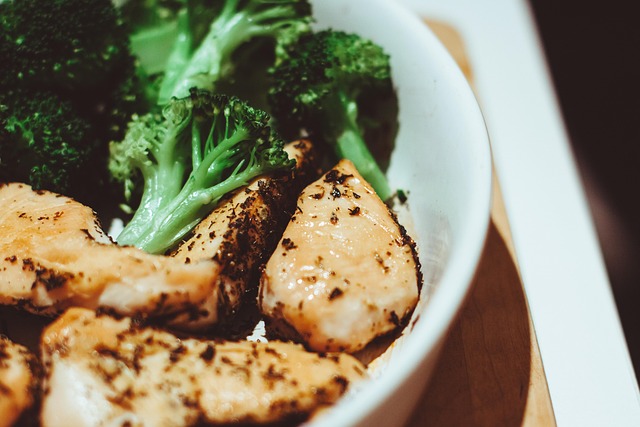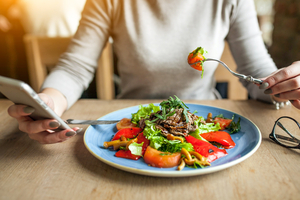In this article:
- Willpower is limited, and depending on it for weight loss can lead to disappointment.
- Using less willpower can make healthy choices easier, more effective, and more rewarding.
- To reduce dependence on willpower, try strategies like building healthy habits, creating a healthy environment, having a support system, and practicing self-compassion
- Your Lark coach is available 24/7 to help you make healthy choices around nutrition, activity, and more.
If you’re depending on sheer willpower, losing weight may feel like a losing battle. It can be hard to feel like you’re fighting to make the healthy choice every time you have a choice to make. Instead of depending on willpower to carry out healthy intentions, shift your focus to making healthy living easier.
There’s good news: You can lose weight even if you consider your willpower to fall short! Here’s what willpower is and why depending on willpower can make your journey tougher. You’ll also read about why habits, your environment, your support system, and your self-compassion can help pave a smoother path to reaching your goals.
What Is Willpower?
Many people think of willpower as the ability to resist temptation. Willpower can include various elements like the following.
- Self-control: Resisting eating leftover pizza when you’re at home alone and the pizza is in the fridge
- Delayed gratification: Going to bed on time consistently, which helps with health and weight loss goals over days and weeks, instead of staying up late to watch a movie
- Override automatic behaviors: Ordering steamed broccoli instead of French fries because the broccoli offers a long-term benefit of weight control, whereas the fries offer instant gratification from their taste
- Self-regulation of thoughts and actions: Instead of automatically agreeing to go out for beer with a work colleague, thinking about the rewards of instead using that time for a walk
Use Less Willpower for Better Results
It’s not just you - it’s uncommon for willpower alone to be strong enough to keep you on track. An article in Frontiers in Neuroscience explains that the more willpower it takes to make a certain choice, the less efficient the behavior is. In addition, you feel less of a reward from making the desired choice.
For example, let’s say there’s an open bag of potato chips on the counter. Depending solely on willpower to avoid eating them may lead to an internal struggle and eating some chips. At the same time, it’s likely to have a feeling of failure even if you ended up eating fewer chips than if you hadn’t tried at all to avoid them.
In contrast, what if we take the same scenario but add more strategies to reduce dependence willpower? Here are some possible tactics.
- Close the bag, preferably tightly and with more than one method, such as using a rubber band to close the bag and then placing the bag in a second bag.
- Put the bag in the pantry, preferably out of sight behind healthier options, and even better, out of reach.
- Don’t have the chips at home in the first place.
- Have low-calorie crunchy alternatives available, like snow peas, baby carrots, cucumber slices, cauliflower or broccoli florets, or mini bell peppers.
With these tactics, you’re likely to eat fewer chips and to feel better about the choice.
You Only Have a Certain Amount of Willpower
Another problem with willpower is that it’s limited. You only have so much willpower to get you through the day or week. Furthermore, your willpower doesn’t just go towards health-related behaviors. You need to draw from that same supply of willpower for other challenges in your life, like getting your work done instead of talking on the phone, staying calm when you’re worried about being late, or choosing whether to go to a movie or put that money into a savings account.
The more you use your willpower, the less well it works. You may know this from experience if you’ve ever come home after a tough day and could not resist the temptation to eat ice cream from the carton or make other choices that interfere with your weight loss or health goals.
Thankfully, there are ways to make healthy choices easier so you can reduce your dependence on willpower.
How to Reach Your Goals with Less Willpower
Whether it’s exercising regularly, taking smaller portions, or going to bed earlier, it’s easier to reach your goals with strategies like establishing habits, creating a productive environment, surrounding yourself with supporting people, and being self-compassionate.
Habits: When a behavior becomes a habit, you don’t have to put as much effort into the behavior. It takes less time and energy to plan the behavior and execute the behavior once it’s a habit compared to when it’s not.
For example, when you start packing a healthy lunch, it can take a lot of effort to replace the habit of going out to eat. You’ll need to replace the action of going to a restaurant and ordering food with actions like figuring out what to pack and shopping for, preparing, and packing those foods.
Eventually, though, these actions become automatic. Without thinking, you might start to select foods for sack lunches like whole-grain bread, sliced low-fat cheese, apples and grapes, and bagged salads. You won’t need to depend on willpower so much.
It can take a while to establish new habits, including up to a few months. You’re also likely to have lapses or temporary breaks in the habit. In the above example, you might forget to shop for healthy foods, so you end up going out to eat for a few days. It takes persistence and patience.
Environment: You may be able to control more about your environment than you think. While you may not be able to eliminate fast food restaurants on every corner, for example, you can take steps to reduce the chances that you patronize them. You might, for example, keep your wallet in the trunk of your car so you don’t use the drive-through, or wear a nice shirt so you don’t want to risk dropping food on it while eating in the car.
Here are other ways to improve your environment to reduce the amount of willpower you need to make healthy choices.
- Serve yourself in the kitchen and carry your plate to the table so it’s harder to take second helpings.
- Park a little further away when you arrive at work so that after work, you don’t have a choice about taking a little walk to your car.
- Only bring healthy snacks into the house so that ice cream, cookies, and chips aren’t a temptation.
- Manage stress in ways like exercising, hanging out with friends, or reading a good book so temptations to stress eat are weaker.
Social support: It can be like swimming upstream against the current when your social network is not on the same page as you. Do your best to spend time with people who support your healthy efforts. That can include agreeing to eat in restaurants with healthy choices, walking with you or watching the kids while you take a walk, or keeping social events earlier in the evening so you can get enough sleep.
Self-compassion: The better you can manage stress and overcome obstacles, the easier it will be to keep trying. The less effort it takes to keep trying, the more you’ll keep trying - and the more likely you’ll be to come closer to your goals. Forgive yourself if you get off track, and support yourself as you get back on track. It’s also helpful to give yourself easy wins - make goals achievable so you can build momentum.
How Lark Can Help
Willpower is just a tiny piece of the puzzle, while making smart choices easier on a routine basis can make for sustainable progress towards your goals. Lark can help you make small changes to improve heart health, lose weight, and manage or prevent chronic conditions. Your Lark coach is available 24/7 for encouragement, nutrition and physical activity coaching, and habit tracking. Lark can help you make healthy choices and establish habits that fit into your lifestyle so you can lose weight and keep it off with or without GLP-1 medications.
Click here to see if you may be eligible to join Lark today!











.webp)









